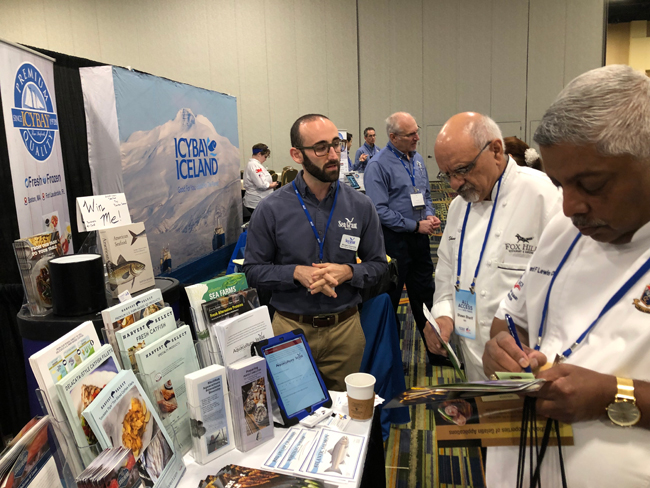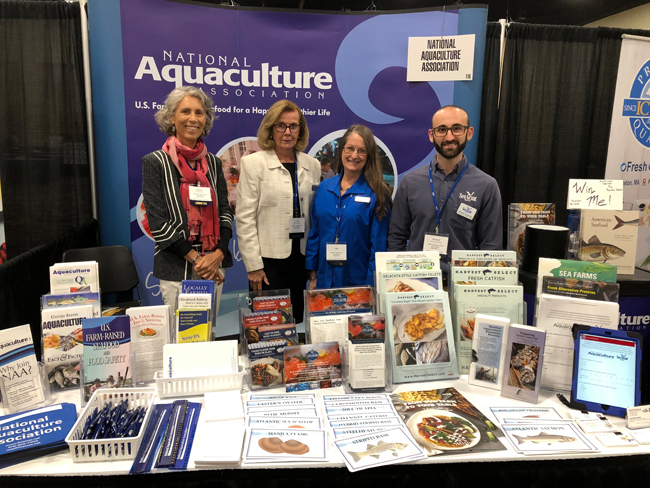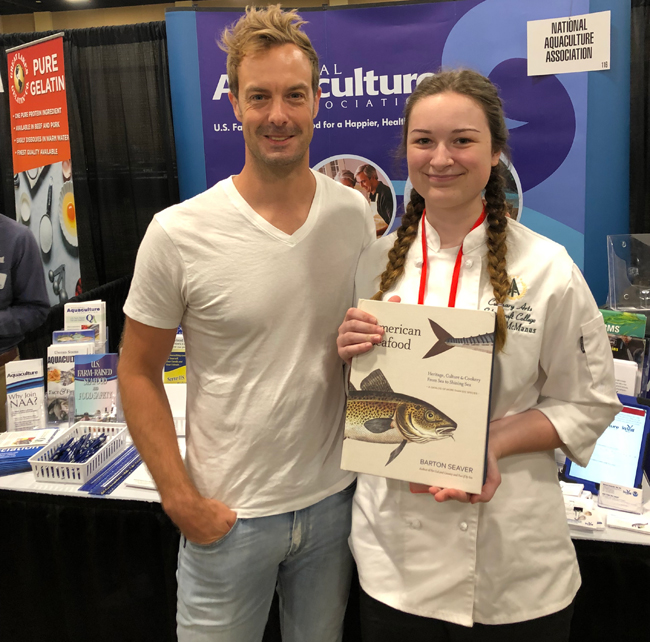
NYSG Seafood Safety & Technology Specialist Michael Ciaramella (pictured above, far left) at the Annual Conference of the American Culinary Federation, held in early August in Orland, Florida. Credit: Michael Ciaramella/NYSG.
Contact:
Michael Ciaramella, NYSG Seafood Safety & Technology Specialist, P: 631-632-8730, E: mc2544@cornell.edu
Stony Brook, NY, August 14, 2019 - The National Aquaculture Association (NAA) and New York Sea Grant (NYSG) hosted a booth at the Annual Conference of the American Culinary Federation (ACF) in Orlando, FL. The ACF is the major professional chefs’ organization in North America with more than 17,500 members in over 150 chapters nationwide.
Participation at the show provided the opportunity to talk directly with chefs and chef educators to better understand their perceptions of U.S. aquaculture, correct misconceptions, provide science-based answers to common questions, and discover new ways to work with the culinary community. A number of U.S. companies provided promotional materials for distribution. Culinary educators were particularly interested in new recipes for old favorites like catfish. Megan Davis of Harbor Branch Oceanographic Institute was also on hand to help answer questions and provide background information.

Credit: Michael Ciaramella/NYSG.
The conference also provided the opportunity to invite more chefs and chef educators to participate in a survey to better understand their attitudes and perceptions about U.S. farm-raised fish. Although most chefs expressed a strong commitment to product quality and sustainability, they often do not make the actual purchase decision or are otherwise constrained by bottom line considerations. This was especially true of culinary educators who have limited budgets.
There was a strong interest in sampling less familiar species. Several chefs provided very workable suggestions for familiarizing restaurants and other foodservice operators with new products. One chef explained that he had spent years working for a seafood company and shared some insights into successfully marketing new and unfamiliar products. His strategy was to arrive at a restaurant dressed in full chef regalia including the white jacket and toque (chef hat) and prepare a dish on site. By ensuring his product was tasted by the chef/restaurateur before leaving, he was able to ensure that they knew how it could/should taste, which increased interest in the products.
Although most interactions were positive, there were several mentions of “frankenfish” which highlights the real need for education and information. There were also concerns about environmental impact, use of antibiotics, food safety inspection, and water use. This provided a good opportunity to explain the many federal and state rules and regulations that govern aquaculture practices in the United States.

Credit: Michael Ciaramella/NYSG.
To help build our list of industry contacts, the book American Seafood by Barton Seaver (pictured above, at left) was raffled. Chef Seaver was on hand to actually autograph the book for the winner.
In late summer, each of the culinary educators on our list will receive copies of the pamphlets and brochures developed by NAA and NYSG. The goal is to remind them to include information about U.S. farm-raised seafood in their classes. This can help to open a dialogue between local chapters of the ACF, culinary schools and growers.
Chefs were anxious to work with us and volunteered to provide recipes and anecdotes for our new promotional materials. This helps to tell the positive story of American aquaculture from the grower to the chef.
More Info: New York Sea Grant
New York Sea Grant (NYSG), a cooperative program of Cornell University
and the State University of New York (SUNY), is one of 33 university-based
programs under the National Oceanic and Atmospheric Administration’s
National Sea Grant College Program.
Since 1971, NYSG has represented a statewide network of integrated
research, education and extension services promoting coastal community
economic vitality, environmental sustainability and citizen awareness
and understanding about the State’s marine and Great Lakes resources.
Through NYSG’s efforts, the combined talents of university scientists
and extension specialists help develop and transfer science-based
information to many coastal user groups—businesses and industries,
federal, state and local government decision-makers and agency managers,
educators, the media and the interested public.
The program maintains Great Lakes offices at Cornell University, SUNY
Buffalo, SUNY Oswego and the Wayne County Cooperative Extension office
in Newark. In the State's marine waters, NYSG has offices at Stony Brook
University in Long Island, Brooklyn College and Cornell Cooperative
Extension in NYC and Kingston in the Hudson Valley.
For updates on Sea Grant activities: www.nyseagrant.org has RSS, Facebook, Twitter, and YouTube links. NYSG offers a free e-list sign up via www.nyseagrant.org/nycoastlines for its flagship publication, NY Coastlines/Currents, which is published quarterly. Our program also produces an occasional e-newsletter,"NOAA Sea Grant's Social Media Review," via its blog, www.nyseagrant.org/blog.